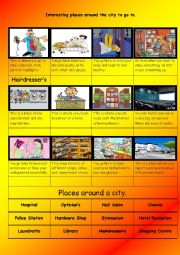
|
Places of interest to visit in your city
Students to read the description and match it to where you would go to see / do this. Part 1 of 2
Level: elementary
Age: 7-100
Type: worksheet
Downloads: 369
|
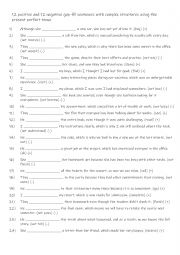
|
A2-B1 Present perfect practise
Students read the sentences and complete it using the present prefect and the clue (+) or (-). There are 12 positive and 12 negative sentences. This worksheet is suitable for A2-B1 students as it contains complex sentences. Answers on page 2.
Level: elementary
Age: 10-100
Type:
Downloads: 121
|
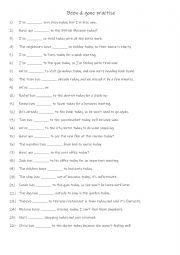
|
A2+-B1 Been & gone practise
Using "been" and "gone" properly helps students master the present perfect tense, which is essential for expressing completed actions that still impact the present.Misusing these words can lead to confusion about whether someone is still at a place or has already returned, so learning the difference is essential for clear communication. Each word i...
Level: intermediate
Age: 9-100
Type:
Downloads: 110
|
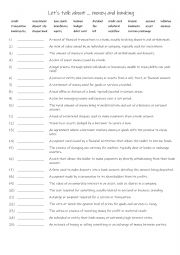
|
B1-B2 Let�s talk about ... money and banking
First, students need to familiarise themselves with the 25 words and their meanings Then they read the definitions to see which one is being described and write that word in the space provided. Answers on page 2.
Level: intermediate
Age: 12-100
Type:
Downloads: 111
|
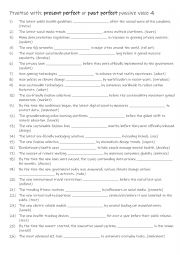
|
B1+-B2 Practise with present perfect or past perfect passive voice 4
Students should learn to practise the present perfect and past perfect passive voice because these structures are vital for expressing completed actions with emphasis on the results rather than the doer. The present perfect passive (e.g., "The work has been finished") is used to discuss actions that affect the present, while the past perfect passiv...
Level: intermediate
Age: 11-100
Type:
Downloads: 111
|
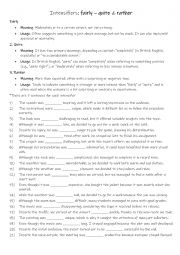
|
B1-B2 Intensifiers - fairly- quite - rather
Students read the meaning and usage of the 3 intensifiers, then read each sentence to see which quantifier is needed to complete the sentence. Answers on page 2 with an explanation why that one was used.
Level: intermediate
Age: 9-100
Type:
Downloads: 139
|
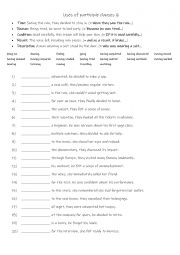
|
Uses of participle clauses 6
Students should learn the five uses of participle clauses because they help create more concise, fluid, and sophisticated sentences. These clauses allow for the expression of time, reason, condition, result, and description in a shorter, more efficient way, making writing and speaking more dynamic and less repetitive. For example, participle clause...
Level: elementary
Age: 10-100
Type:
Downloads: 117
|
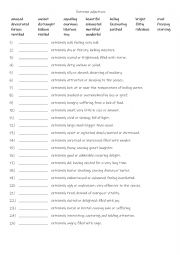
|
B1 25 Extreme adjectives to enhance meaning
Extreme adjectives, like "fantastic" or "awful," allow students to express strong emotions more effectively, making their language more vivid and impactful. Learning these adjectives expands their vocabulary, making them sound more fluent and confident when speaking or writing in English.First students familiarise themselves with the 25 extreme adj...
Level: intermediate
Age: 10-100
Type: worksheet
Downloads: 133
|
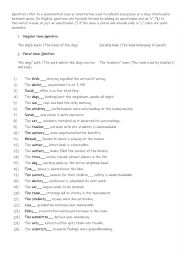
|
Singular and Plural genitives
This worksheet is suitable for A2-B1 level students. Genitives refer to a grammatical case or construction used to indicate possession or a close relationship between nouns. In English, genitives are typically formed by adding an apostrophe and an "s" (�s) to the end of a noun, or just an apostrophe (�) if the noun is plural and already ends in...
Level: elementary
Age: 8-100
Type:
Downloads: 112
|
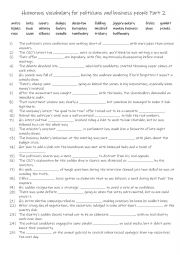
|
B2-C1 Humorous vocabulary for politicians and business people Part 2
Students familiarise themselves with the 25 words and their meanings. Then they read the sentences and write the required word to complete the gap-fill. Answers on page 2.
Level: advanced
Age: 12-100
Type:
Downloads: 107
|












